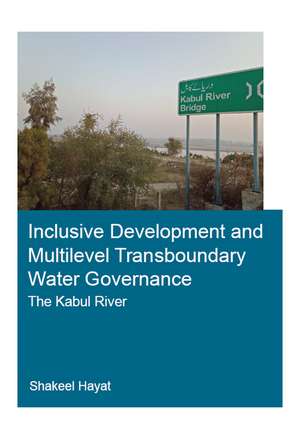Inclusive Development and Multilevel Transboundary Water Governance - The Kabul River: IHE Delft PhD Thesis Series
Autor Shakeel Hayaten Limba Engleză Paperback – 29 apr 2020
Din seria IHE Delft PhD Thesis Series
-
 Preț: 377.82 lei
Preț: 377.82 lei - 23%
 Preț: 473.10 lei
Preț: 473.10 lei - 23%
 Preț: 257.25 lei
Preț: 257.25 lei - 28%
 Preț: 492.31 lei
Preț: 492.31 lei - 23%
 Preț: 472.25 lei
Preț: 472.25 lei - 16%
 Preț: 322.98 lei
Preț: 322.98 lei - 29%
 Preț: 524.35 lei
Preț: 524.35 lei - 31%
 Preț: 295.46 lei
Preț: 295.46 lei - 22%
 Preț: 399.88 lei
Preț: 399.88 lei - 30%
 Preț: 1015.76 lei
Preț: 1015.76 lei - 17%
 Preț: 268.83 lei
Preț: 268.83 lei - 44%
 Preț: 256.76 lei
Preț: 256.76 lei - 23%
 Preț: 254.47 lei
Preț: 254.47 lei - 25%
 Preț: 339.78 lei
Preț: 339.78 lei - 13%
 Preț: 322.01 lei
Preț: 322.01 lei - 26%
 Preț: 455.79 lei
Preț: 455.79 lei - 28%
 Preț: 399.06 lei
Preț: 399.06 lei - 27%
 Preț: 427.41 lei
Preț: 427.41 lei - 22%
 Preț: 371.52 lei
Preț: 371.52 lei - 26%
 Preț: 373.21 lei
Preț: 373.21 lei - 26%
 Preț: 328.64 lei
Preț: 328.64 lei - 18%
 Preț: 348.86 lei
Preț: 348.86 lei - 22%
 Preț: 369.82 lei
Preț: 369.82 lei - 18%
 Preț: 174.31 lei
Preț: 174.31 lei - 26%
 Preț: 414.78 lei
Preț: 414.78 lei - 23%
 Preț: 454.94 lei
Preț: 454.94 lei - 27%
 Preț: 315.05 lei
Preț: 315.05 lei - 21%
 Preț: 256.32 lei
Preț: 256.32 lei - 18%
 Preț: 296.68 lei
Preț: 296.68 lei - 22%
 Preț: 353.39 lei
Preț: 353.39 lei - 23%
 Preț: 326.95 lei
Preț: 326.95 lei - 18%
 Preț: 349.36 lei
Preț: 349.36 lei - 28%
 Preț: 366.05 lei
Preț: 366.05 lei - 22%
 Preț: 322.47 lei
Preț: 322.47 lei - 27%
 Preț: 425.74 lei
Preț: 425.74 lei - 22%
 Preț: 211.93 lei
Preț: 211.93 lei - 27%
 Preț: 474.03 lei
Preț: 474.03 lei - 16%
 Preț: 322.98 lei
Preț: 322.98 lei - 27%
 Preț: 367.30 lei
Preț: 367.30 lei - 25%
 Preț: 328.22 lei
Preț: 328.22 lei - 23%
 Preț: 350.43 lei
Preț: 350.43 lei - 25%
 Preț: 472.25 lei
Preț: 472.25 lei - 28%
 Preț: 498.58 lei
Preț: 498.58 lei - 28%
 Preț: 349.59 lei
Preț: 349.59 lei - 24%
 Preț: 163.04 lei
Preț: 163.04 lei - 13%
 Preț: 350.29 lei
Preț: 350.29 lei - 28%
 Preț: 550.16 lei
Preț: 550.16 lei - 25%
 Preț: 552.62 lei
Preț: 552.62 lei - 23%
 Preț: 384.59 lei
Preț: 384.59 lei - 20%
 Preț: 177.00 lei
Preț: 177.00 lei
Preț: 594.85 lei
Preț vechi: 799.95 lei
-26% Nou
Puncte Express: 892
Preț estimativ în valută:
113.84€ • 118.41$ • 93.98£
113.84€ • 118.41$ • 93.98£
Carte tipărită la comandă
Livrare economică 12-26 aprilie
Preluare comenzi: 021 569.72.76
Specificații
ISBN-13: 9780367500740
ISBN-10: 0367500744
Pagini: 336
Dimensiuni: 170 x 240 mm
Greutate: 0.32 kg
Ediția:1
Editura: CRC Press
Colecția CRC Press
Seria IHE Delft PhD Thesis Series
ISBN-10: 0367500744
Pagini: 336
Dimensiuni: 170 x 240 mm
Greutate: 0.32 kg
Ediția:1
Editura: CRC Press
Colecția CRC Press
Seria IHE Delft PhD Thesis Series
Public țintă
PostgraduateCuprins
Introduction, Methodology & analytical framework, Approaches to transboundary water governance, Ecosystem services & human well-being, Global water institutions & its relationship with inclusive & sustainable development, Analysis of international relations in the Kabul River Basin (KRB), Analysis of water governance in Afghanistan, Analysis of multilevel freshwater governance in Pakistan, Multi-level integrated analysis focusing on issues for re-design, Conclusion.
Notă biografică
Shakeel Hayat has diverse work experience in research, policy analysis and development practice with a multitude of national and international organisations in water governance and climate change. He completed his MSc in Climate Change and International Development from the University of East Anglia, UK and wrote thesis on "Power Politics and Water Governance in the Indus Basin". He has contributed in various peer reviewed articles and project reports on water governance including the Sustainable Development Goals. His current PhD project is a multi-disciplinary research revolving around institutional analysis of the Kabul River by proposing a (re)design of the governance framework at multiple geographic levels to deal with status-quo and achieve inclusive and sustainable development.
Descriere
This book goes beyond hydro-hegemony by carefully assessing various institutional frameworks to address the influence of power over water policies and key players by proposing alternative strategies for effective multilevel transboundary water governance.
